
Stepan Bandera between two evils
From Wikipedia:
Stepan Andriyovych Bandera (Ukrainian: Степа́н Андрі́йович Банде́ра, Polish: Stepan Andrijowycz Bandera)
January 1909 – 15 October 1959) was a Ukrainian far-right leader of the radical, terrorist wing of the Organization of Ukrainian Nationalists named OUN-B.
Soviet KGB multiple times attempted to kidnap or assassinate Bandera. On 15 October 1959, Bandera collapsed outside of Kreittmayrstrasse 7 in Munich and died shortly thereafter. A medical examination established that the cause of his death was poison by cyanide gas.
Bandera remains a highly controversial figure in Ukraine, with many Ukrainians hailing him as a role model hero, martyred liberation fighter,while other Ukrainians, particularly in the south and east, condemn him as a fascist Nazi collaborator who was, together with his followers, responsible for the massacres of Polish and Jewish civilians.
Main historical facts
After Ukraine became a part of Soviet Union in the early thirtieth happened a terrible
famine in this territory.
"Holodomor". This is the Ukrainian word for a special famine. Not the "normal" natural disaster. The Holodomor is deliberately man-made.
The one sent to Ukraine by Stalin killed over 3 million people. Estimates vary, there may have been more than twice as many victims.
From Wikipedia:
While scholars universally agree that the cause of the famine was man-made, whether the Holodomor constitutes a genocide remains in dispute. Some historians conclude that the famine was planned and exacerbated by Joseph Stalin in order to eliminate a Ukrainian independence movement. Others suggest that the famine arose because of rapid Soviet industrialisation and collectivization of agriculture.
This tragedy certainly strengthened the anti-Soviet mood of the Ukrainian population and increased the desire for the independence of this territory. Whatever the detailed causes, there is no doubt that the Stalinist regime brought unimaginable tragedy to this fertile part of the country.
Most important facts from life of Stepan Bandera
In June 1934, Bandera participated in the assassination of the then Polish Minister of the Interior, Bronislaw Pieracky, and in January 1936 he was sentenced to death.
In the trial, Bandera declared that Ukrainians would have to shed a lot of blood for the idea of an independent Ukraine.
"To bring not troops, not hundreds, but millions of victims, so that we can finally make it happen," he literally said.
The sentence was eventually changed to life imprisonment. Poland did not want to exacerbate the already strained relations with the Ukrainian minority by executing the Ukrainian assassins. Freed from prison in 1939 following the invasion of Poland, Bandera prepared the 30 June 1941 Proclamation of Ukrainian statehood in Lviv, pledging to work with Nazi Germany after Germany invaded the Soviet Union on 22 June 1941.
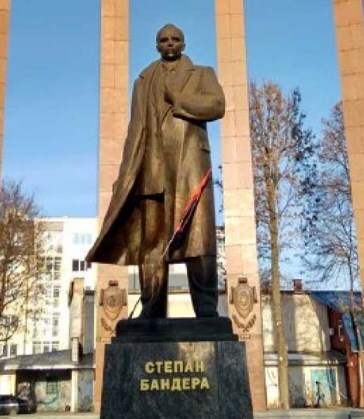
Ukrainian territory
Before World War II, the territory of present-day Ukraine was divided between Poland, the Soviet Union, Romania and Czechoslovakia. Prior to the 1939 invasion of Poland, German military intelligence recruited members of the OUN into the Bergbauernhilfe unit and also smuggled Ukrainian nationalists into Poland to disrupt Polish defenses by conducting a terrorist campaign targeting Polish farmers and Jews. OUN leaders Andriy Melnyk (code name Consul I) and Bandera (code name Consul II) both served as agents of Nazi Germany's military intelligence - the Abwehr.
The radicalization of national efforts was brought about by the establishment of the Organization of Ukrainian Nationalists (OUN) in interwar Poland, in which Stepan Bandera became the main propagandist after 1931. During the war, the movement became the base of the Ukrainian Insurgent Army (UPA) and it set out to eliminate its Polish neighbors "by all available means", as it literally set out.
On June 23, 1941, one day after the German attack on the Soviet Union, Bandera sent a letter to Hitler arguing for an independent Ukraine. With the arrival of Nazi troops in Ukraine, Bandera and the OUN-B (Organisation of Ukrainian Nationalists) unilaterally proclaimed an independent Ukrainian state ("Act on the Restoration of Ukrainian Statehood"). The proclamation promised the cooperation of the new Ukrainian state with Nazi Germany under Hitler, with the closing remark "Glory to the heroic German army and its Führer Adolf Hitler". The declaration was accompanied by violent pogroms.
In spite of this Bandera was arrested by the Gestapo and imprisoned in concentration camps. In the meantime, the UPA (Ukrainian Insurgent Army) cooperated with the Germans in some places, and fought with them in others. She brutally expelled the Poles from today's western Ukraine, with over 100,000 people killed. Its members were also responsible for the extermination of Jews and Volhynia Czechs (historical Volhynia is situated in Poland, Belarus, Ukraine).
After a turn in the war, the Red Army and the Soviet NKVD secret service became the UPA's main rivals. Bandera, with the help of the Germans, directed the actions of the UPA from Berlin, which fought the Soviet regime in some areas until the early 1950s. In October 1959, Bandera was assassinated by a Soviet agent with cyanide in Munich.
Volhynia tragedy
The war atrocities committed by the UPA army in the eastern part of Poland, which extended deep into the territory of today's Ukraine, were done with the tacit approval of the German command. The Nazis did not prevent the Bandera followers from exterminating Polish villages, and understandably they did not mind the Ukrainian pogroms of the large Jewish community either.
In the so-called Volhynia, the banders murdered an estimated 50,000 to 80,000 Polish civilians. Among other things, the Warsaw Institute of National Remembrance describes a series of massacres from the spring of 1943. For example, on March 26, 1943, UPA troops murdered 179 residents of the village of Lipniki, on April 23, 600 civilians died under Ukrainian weapons in the village of Janowa Dolina, and on May 12, 170 people died in the village of Niemodlin ...
The details of the massacres are described in professional literature, and sometimes they surpassed the crimes of the Nazis themselves or the atrocities of the Russian armed forces in Bucha, Mariupol or elsewhere in today's Ukraine. The UPA murdered women, children and the elderly,details about this masacres are absolutely horrifying...
Although Stepan Bandera was not present at these atrocities (with the exception of the massacres in and around Lviv in July 1941), because the Nazis interned him on German territory not long after the occupation of Lviv. However, according to Polish historians, the UPA units fulfilled exactly the goals that Bandera gave to the movement in the 1930s.
Gloryfying of Bandera in Ukraine
In spite of all these well-known fact Ukrainians continue to glorify Stepan Bandera.
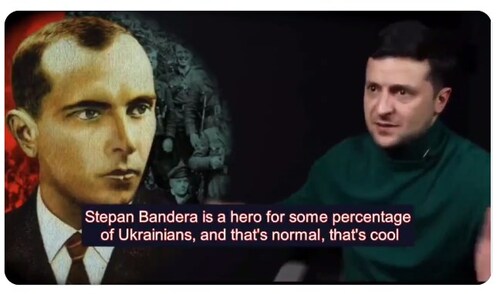 From a video on twitter - Zelenskyi defends Bandera
From a video on twitter - Zelenskyi defends Bandera
The last time the Ukrainians didn't hold back was earlier this year and irritated their Polish and allies in the war with the Kremlin regime by celebrating Stepan Bandera's 114th birthday on the grounds of the Ukrainian parliament. On the same occasion, the commander of the Ukrainian Armed Forces, Valery Zaluzhny, was seen on Twitter with Bandera's portrait. After a loud protest from Warsaw, the post was deleted.
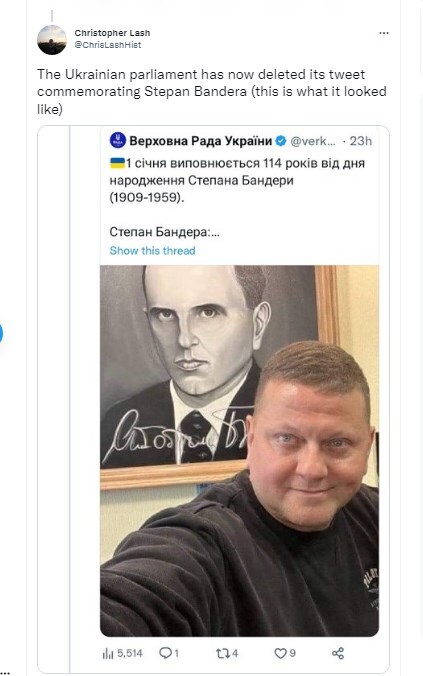 Deleted tweet of Ukrainian parliament was retweeted more times
Deleted tweet of Ukrainian parliament was retweeted more times
The founder of modern Ukraine - and at the same time a criminal, tainted by collaboration with the Nazis. You can read all this about a man who dedicated his life to building an independent Ukrainian state. He didn't hesitate to team up with almost anyone to make that dream come true.
Protests from Poland and Czechia
"The Ukrainian nationalism of Stepan Bandera and other representatives of the radical movement resulted in an absolutely unacceptable tragedy during the Second World War," Polish historian Józef Szymeczek recalls of the Polish view of the events. Similar to other European nations, Ukrainians also longed for a national identity and their own state. "However, at a time of a certain political vacuum, they tried to do it in a completely unacceptable way," he says.
In July 2016, the Polish Sejm adopted a law that designates the crimes of 1943 to 1944 committed by the Bandera people against the Poles as genocide.
Czech member of European Parliament Jan Zahradil commented the celebrating
of Bandera at the occassion of his 114th anniversary of birth:
"However, this is not "Russian propaganda".
That really happened.
The Poles have already spoken. And we shouldn't be silent either.
Even Russian aggression towards Ukraine cannot be an excuse for turning a blind eye to the brown tones in the contemporary Ukrainian national upheaval."
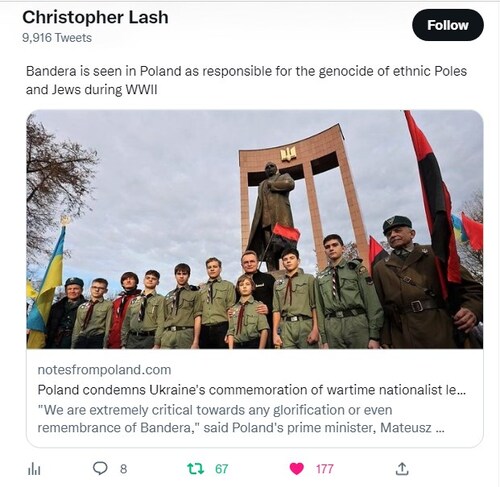
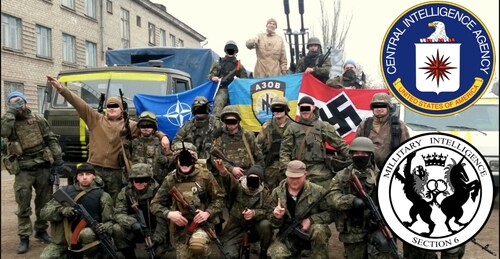
For thirty years we have not seen the resurgence of Nazi racism in Ukraine nor that many of the Ukrainian civilians we welcome are soaked in Bandera ideology. We are waiting for the Nazi attacks to begin in Western Europe before we wake up.
Though this topic may seem at first sight very complicated it is perhaps only in appearance. Historical facts are intertwined like in a detective story and it is not easy to navigate them. There are many events that started many years before the Second World War and ended long after it. But really, the main takeaway from the whole story is a general lesson.
Every extreme is harmful.
Evil cannot be eliminated by evil.
Thanks for reading
Margaret
Sources:
